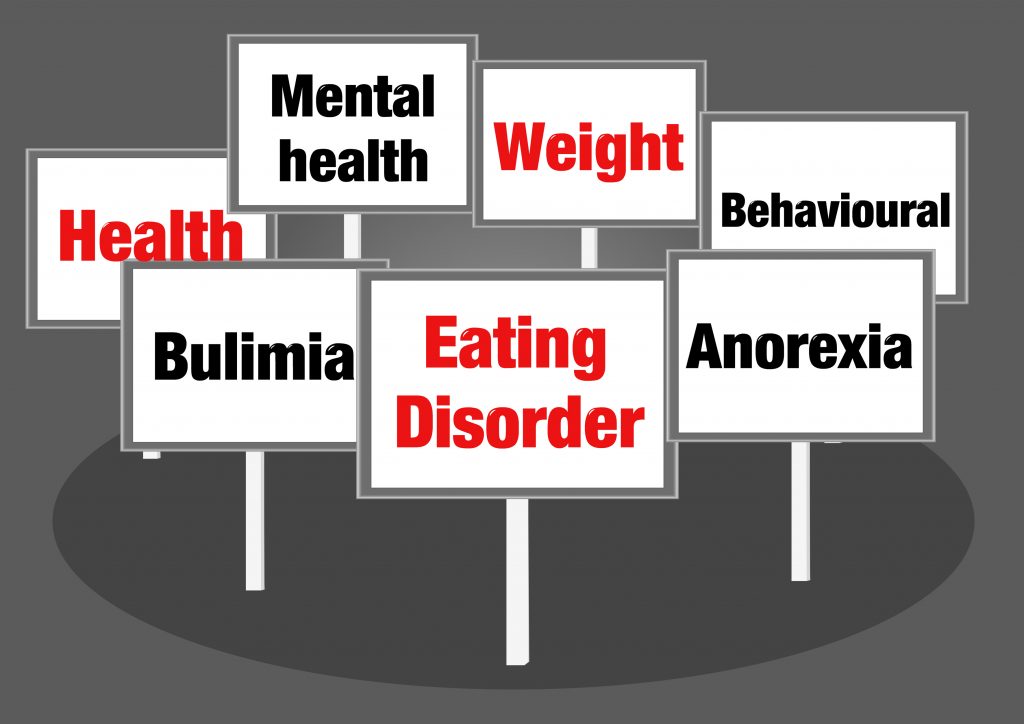Eating disorders, including anorexia, bulimia, and binge eating disorder, often co-occur with other mental health conditions, such as mood disorders. Mood disorders that might interplay with eating disorders include anxiety, depression, post-traumatic stress disorder, and bipolar disorder. Research has found that mood disorders occur more frequently among individuals with eating disorders than those without eating disorders, making the illness and prognosis more complex [1].
A combination of mental illnesses that can develop alongside one another is bulimia nervosa and depression. Because of the severity of symptoms that can result from these co-occurring mental illnesses, professional and comprehensive treatment is necessary for healing and recovery. Important treatment options to consider for co-occurring bulimia and depression include psychotherapy, medication management, medical nutrition therapy, and more.
How Bulimia and Depression Overlap
Bulimia is an eating disorder characterized by binge eating, purgative behavior, and depressed mood following eating binges [2]. Depression and bulimia often overlap with one another, and the combination of these mental illnesses can perpetuate the binge/purge cycle of bulimia while intensifying depression.
For women who struggle with both depression and bulimia, it can be difficult to pinpoint how these illnesses develop alongside one another. Research has shown that there are several factors that influence the development of mental illnesses, such as bulimia and depression, including genetic predisposition, exposure to trauma, environmental stressors, and psychosocial factors [3]. Just like the age-old question of “what came first – the chicken or the egg?” it’s unclear if depression can be a precursor for an eating disorder or vice versa.
The experience of bulimia and depression is highly individual, based on the woman and her unique set of circumstances. In some instances, a woman struggling with depression may resort to maladaptive eating behaviors as a means of coping with the pain and isolation of a mood disorder. In other situations, bulimia can be a trigger for depression, and the recurring act of binging and purging can result in physical, mental, and psychological consequences that precipitate depression.
For these reasons, a combination of treatments and therapies are needed to address the root causes of these mental illnesses. A woman suffering from co-occurring bulimia and depression would need to have these conditions treated simultaneously to optimize healing, as these illnesses go hand-in-hand.
DBT is an Effective Treatment
One promising treatment for co-occurring bulimia and depression is dialectical behavioral therapy (DBT), a form of psychotherapy that includes skills for emotion regulation, distress tolerance, mindfulness, and interpersonal effectiveness. In simpler words, DBT helps women transform destructive behaviors into more positive outcomes.
This an essential component of recovery for a woman who may be using the damaging behaviors of bulimia, such as binging and purging, to cope with her depression. DBT has been shown to be an effective form of therapy and treatment, specifically for people diagnosed with eating disorders, as it helps them better regulate their emotions, reduce stress and anxiety, control destructive eating behaviors, and build self-management skills [4].
The main skills developed through DBT include the following:
Distress Tolerance: Learning how to tolerate painful and/or difficult situations, not avoid or try to numb it, which is necessary for someone using bulimia to cope with depression.
Emotional Regulation: How to change desired emotions, which can support a woman who is suffering from the weight of depression.
Mindfulness: Learning how to be aware and present in the moment; again, for someone who may be using bulimic behaviors to escape from depression, this can be helpful for learning how to engage in the present moment.
Interpersonal Effectiveness: Learning how to ask for what you want while maintaining healthy boundaries and self-respect in a relationship.
While DBT alone is not a sufficient treatment for a woman dealing with both depression and bulimia, it can be a powerful form of therapy for breaking free from the vicious cycle that recurs with these mental illnesses. It can also be effective in helping a woman build new tools for coping with difficult circumstances in a positive manner, rather than resorting to eating disorder behaviors.
DBT therapy for bulimia and eating disorders can be facilitated by a specialized psychotherapist with a professional background and experience in these co-occurring illnesses. Treatment centers, like The Meadows Ranch, offer the full scope of treatments needed to help a woman overcome these illnesses, including DBT, which is an evidence-based approach for healing from mental illnesses.
Finding Hope for Recovery
In the throes of an eating disorder and mental illness, like bulimia and depression, freedom from the oppression of these conditions can feel like an impossible feat.
If you or someone you love has been struggling with both a mood disorder, like depression and an eating disorder, it is important to understand that you don’t have to go through this alone. Working with a multidisciplinary treatment team can help you tackle the hard issues involved with these mental health conditions and give you hope for a future that is not dictated by depression and an eating disorder.
At The Meadows Ranch, we can offer you the safe space you need to heal and find true and lasting recovery. You don’t have to wait to start living; your best life can start today. Connect with us to learn more about our approach to healing for co-occurring mood and eating disorders.
References:
[1]: Godart, N. et al. Mood disorders in eating disorder patients: prevalence and chronology of ONSET. Journal of Affective Disorders 2015. Volume 185, pages 115-122 [2]: Hinz, L. D., & Williamson, D. A. (1987). Bulimia and depression: A review of the affective variant hypothesis. Psychological Bulletin, 102(1), 150-158.http://dx.doi.org/10.1037/0033-2909.102.1.150 [3]: National Eating Disorder Association, “What are eating disorders? Risk Factors”, https://www.nationaleatingdisorders.org/risk-factors Accessed 1 June 2018 [4]: The Linehan Institute, “What is DBT – Overview”, https://linehaninstitute.org/dbt/ Accessed 1 June 2018

